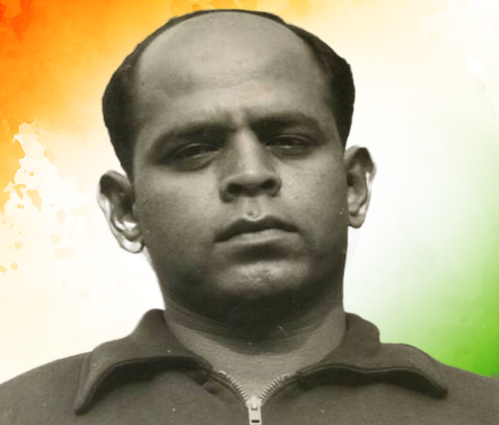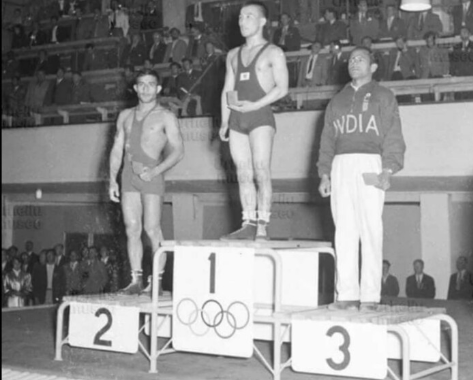
Introduction
In the annals of Indian sports history, few names shine as brightly as Khashaba Dadasaheb Jadhav, (K.D.Jadhav ) commonly known as K D Jadhav, was an Indian athlete who is best known for winning a bronze medal at the 1952 Summer Olympics in Helsinki. He was the first athlete from independent India to win an individual medal in the Olympics. Jadhav was extremely nimble on his feet, which made him different from other wrestlers of his time. He belonged to Goleshwar village near Karad, Maharashtra.
Early Life
Born in a village called Goleshwar in Karad taluka of District Satara in Maharashtra State, KD Jadhav was the youngest of five sons of a renowned wrestler Dadasaheb Jadhav. He did his schooling in Tilak High School in Karad taluka of Satara district between 1940–1947. He grew up in a household that lived and breathed wrestling. He participated in the Quit India Movement providing shelter and a hiding place to the revolutionaries, circulating letters against the British were some of his contributions to the movement. He resolved to unfurl the tricolor flag in Olympics on Independence Day 15 August 1947.
Wrestling Career
Jadhav’s father, Dadasaheb, was a wrestling coach and initiated Khashaba into wrestling at the age of five. His wrestling mentors in college were Baburao Balawde and Belapuri Guruji. His success in wrestling did not avoid him from getting good grades. Starting his wrestling career in 1948, he first came into limelight at the 1948 London Olympics when he finished 6th in the flyweight category. He was the first Indian to achieve such a high a position in the individual category until 1948. Despite being new to wrestling on a mat as well as the international rules of wrestling, Jadhav’s 6th-place finish was no mean feat at that time.

For the next four years, Jadhav trained even harder for the Helsinki Olympics where he moved up one weight category and participated in the bantamweight category (57 kg) which saw wrestlers from twenty-four different countries. He went on to defeat wrestlers from countries like Mexico, Germany and Canada, before losing his semi-final bout, but he came back stronger to win the bronze medal which made him the first ever individual Olympic medalist of independent India.
1948 Summer Olympics
Jadhav’s first feel of the big stage was at the 1948 London Olympics; his journey was funded by the Maharaja of Kolhapur. During his stay in London, he was trained by Rees Gardner, a former lightweight World champion from the United States. It was Gardner’s guidance that saw Jadhav finish sixth in the flyweight section, despite being unfamiliar with wrestling on the mat. He stunned the audience by defeating the Australian wrestler Bert Harris in the first few minutes of the bout. He went on to defeat Billy Jernigan of the US, but lost to Mansour Raeisi of Iran, to be eliminated from the Games.
1952 Summer Olympics
Triumph in Helsinki
The 1952 Helsinki Olympics marked a watershed moment in Jadhav’s career. Here, we chronicle his extraordinary journey to the Olympic podium, reliving the intense battles, the adrenaline-pumping matches, and the sheer determination that propelled him to become the first Indian wrestler to win an Olympic medal.
Inspiring a Nation
The Enduring Impact of K.D. Jadhav
Beyond his athletic prowess, Jadhav’s legacy resonated far and wide. We explore his impact on Indian wrestling and the nation’s sporting landscape as a whole. From inspiring future generations of wrestlers to pioneering a path for Indian athletes on the global stage, Jadhav’s influence continues to be felt even today.
Legacy
K D Jadhav is remembered as a true champion and a trailblazer for Indian sports. He was posthumously awarded Arjuna Award in 2000 for his contribution to wrestling. Despite his historic achievement, Jadhav never received a Padma Award during his lifetime, making him the only Indian Olympic medalist to have not received the award. Despite this, his legacy lives on and he remains a true inspiration to many aspiring athletes in India.
Conclusion
As we conclude this blog, we pay homage to the indomitable spirit of K.D. Jadhav. His journey, from humble beginnings to Olympic glory, serves as an inspiration for aspiring athletes worldwide. Through his relentless pursuit of excellence, he blazed a trail for Indian wrestling, leaving an indelible mark on the sport. K.D. Jadhav’s legacy serves as a testament to the power of perseverance, the triumph of the human spirit, and the unwavering belief that dreams can be turned into reality.
